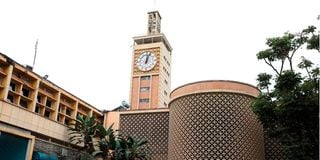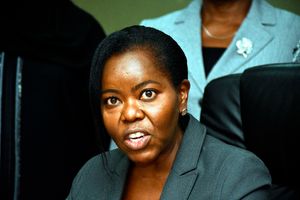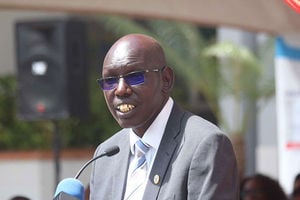
A section of Parliament Buildings, Nairobi.
A parliamentary committee has backed a bill that seeks to extend the life of the equalisation fund by another ten years.
The National Assembly’s Finance and National Planning Committee on Thursday approved the Equalisation Fund Bill, 2023, that originated from the Senate.
The bill seeks to suspend the application of Article 204 (7) of the Constitution and extend the pendency of the fund.
Established in the Constitution in 2010, the fund is expected to be wound up in the year 2030. The Fund was scheduled to lapse 20 years after the effective date of the Constitution which was promulgated in 2010.
“The Fund shall remain in force for a further non-renewable term of 10 years from the date upon which the Fund would have lapsed under Article 204(6) of the Constitution,” Article 204 (7) reads in part.
The Equalisation comprises 0.5 percent of all revenue collected by the national government each year.
The fund is established under Article 204 of the Constitution to accelerate the level of services in marginalised areas bringing them up to par with the rest of the country.
The money is meant to provide basic services, including water, roads, health facilities and electricity to marginalised areas.
“Parliament may enact legislation suspending the effect of clause 204 (6) for a further fixed period of years,” the Constitution states.
It will require the support of more than half of all the 349 members of the National Assembly, and more than half of all the county delegations in the Senate to approve the Bill to extend the 20 years.
The Controller of Budget (CoG), the Commission on Revenue Authority (CRA), the Council of Governors (CoG), the Law Society of Kenya (LSK), and the Equalisation Fund Board have backed provisions of the Bill.
Appearing before the committee chaired by Molo MP Kuria Kimani, the Controller of Budget representative Brian Mutie on Thursday asked MPs to delete Clause 32 of the bill that requires the Fund to be extended by a further non-renewable term of ten years.
“The House may decide to elongate or suspend the term altogether. There is no need to have a fixed duration as this fund is critical in bringing services in marginalised areas to the level generally enjoyed by the rest of the nation,” Mr Mutie said during public participation on the Bill.
The Law Society of Kenya (LSK) vice president Mwaura Kabata asked the committee to define the period the fund can be extended and remove provisions that limit its duration.
He said the provisions limiting the period for ten non-renewable terms should be removed to allow flexibility for the Fund to be extended even after the extended period.
“Do not box yourselves on the non-renewable term. We will still need the Fund even after the extended period,” Mr Kabata said.
“The Constitution foresees the possibility of extending the Equalisation Fund.”
The Commission on Revenue Allocation chairperson Mary Chebukati supported the extension of the period for the Equalisation Fund, arguing some areas continue to be marginalised.
The CRA identified water, health services, and education access as key issues that marginalised counties lack.
Beneficiaries of the fund are Turkana, Lamu, Mandera, Wajir, Marsabit, Samburu, West Pokot, Tana River, Narok, Kwale, Garissa, Kilifi, Taita Taveta and Isiolo.
The new Bill provides a framework for the administration and management of the Equalisation Fund, provides for the completion of ongoing projects under the First and Second policies, provides a framework for the identification, selection, and implementation of projects for purposes of the Fund, suspend the application of Article 204(7) of the Constitution and extend the pendency of the Fund, and provide for the procedures concerning winding up of the Fund.
The Bill also establishes the Equalisation Fund Advisory Board whose functions will be among others advise and make recommendations to the Cabinet Secretary on the distribution of resources for the provision of basic services to the marginalised areas under Article 204 of the Constitution in line with the recommendations of the Commission on Revenue Allocation.







